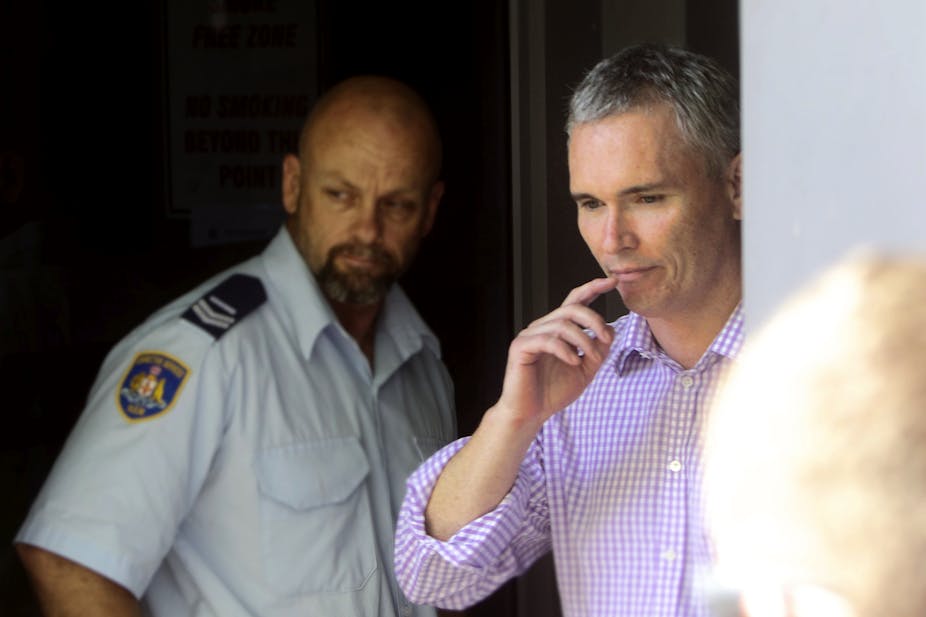The Craig Thomson case will take over a year to work its way through the Victorian courts and is unlikely to result in the fall of the Gillard government before the September election, experts said today.
Mr Thomson, a former Labor MP who was arrested yesterday on 150 fraud charges, has said he has done nothing wrong.
The consequences for parliament
Mr Thomson would be disqualified from parliament if found guilty, forcing a by-election and the possibility of the Coalition winning a majority in parliament, but that scenario is now unlikely, said Anne Twomey, Professor of Constitutional Law at the University of Sydney.
“The likelihood of the government falling because of a conviction is pretty slim,” she said.
“The fact that Prime Minister Gillard has announced an election date takes a lot of the heat out of it. If it had happened a year ago, things might have been different.”
Professor Twomey said that even if the wheels of justice in Victoria move very quickly, “there’s Buckley’s chance of there being a by-election on this before the next election” because it would be an enormous waste of money so close to a general election.
“Once you count the time taken to hold the by-election, there would be very few parliamentary sitting days left before the general election is held,” she said.
If Mr Thomson voluntarily resigned his seat, stopped attending parliament or became bankrupt, it would be up to the Speaker to decide whether or not to issue writs for a by-election, said Professor Twomey.
Mr Thomson is no longer a Labor member, but it is assumed he would vote with the government if he remained in parliament while the case was being heard.
However, should he cease to attend parliament, the Gillard government could still hold power unless they lost a no-confidence vote in Parliament, said Professor Twomey.
“But I query in whether Mr Abbott has an interest anymore in bringing down the government with a vote of no confidence. It’s in his interests that he has a period of time to prepare for the election,” she said.
“From his point of view, bringing down the government early, if he didn’t have his policies costed and ready to run, may not necessarily be advantageous.”
Even if Labor lost Mr Thomson’s vote, an independent MP such as Bob Katter or Andrew Wilkie could vote with the government if a snap election was not in their interest, she said.
Over a year in the courts
Professor Mirko Bagaric, Dean of the School of Law at Deakin University, said Mr Thomson’s case would take 12 months or more to make its way through the courts.
“His case will almost definitely be finalised in the county court. Prior to getting there, it needs to get through a committal process to see if there is sufficient evidence to justify sending the matter to the county court,” he said.
Another procedural step involved is called a filing hearing, where a magistrate will make orders on the brief of evidence to be served on Mr Thomson and his lawyers.
A committal mention hearing will follow, in which the court will determine which witnesses Mr Thomson and his lawyers can call for the contested committal hearing.
Orders are then made for the length of the contested committal hearing and a date is set for that hearing, said Professor Bagaric.
If sufficient evidence exists for the case to proceed to the county court, a jury will hear the case and, if a guilty verdict is delivered, a judge will hand down a sentence.
“All that will take at least 12 months,” said Professor Bagaric.
“If he is found guilty, then his lawyers can appeal to the Victorian Court of Appeal and it will normally take another six to nine months for that to be heard in the Court of Appeal.”
If the appeal is unsuccessful, Mr Thomson will have the option of seeking special leave to appeal to the High Court but only abut 10% of people who appeal to the High Court are given permission to have their case heard there, he said.
“This whole case will be particularly lengthy because there are about 150 different charges. The brief of evidence is likely to be very extensive,” said Professor Bagaric, adding that unlike sex-related cases, fraud cases are not usually fast-tracked through the Victorian court system.
“We almost certainly won’t have any finality before the general election,” he said.

